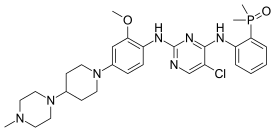Brigatinib
 | |
| Clinical data | |
|---|---|
| Trade names | Alunbrig |
| Routes of administration | By mouth |
| ATC code |
|
| Identifiers | |
| |
| CAS Number | |
| PubChem CID | |
| IUPHAR/BPS | |
| ChemSpider | |
| UNII | |
| KEGG | |
| PDB ligand | |
| Chemical and physical data | |
| Formula | C29H39ClN7O2P |
| Molar mass | 528.22 |
| 3D model (JSmol) | |
| |
| |
Brigatinib (INN,[1] previously known as AP26113, marketed as Alunbrig) is an investigational small-molecule targeted cancer therapy being developed by ARIAD Pharmaceuticals, Inc.[2] Brigatinib has exhibited activity as a potent dual inhibitor of anaplastic lymphoma kinase (ALK) and epidermal growth factor receptor (EGFR).
In 28 April 2017, it was granted an Accelerated Approval from the US FDA for metastatic non-small cell lung cancer (NSCLC);[3][4] as a 2nd-line therapy for ALK-positive NSCLC.[5]
In 2016, brigatinib was granted orphan drug status by the FDA for treatment of NSCLC.[6]
Brigatinib could overcome resistance to osimertinib conferred by the EGFR C797S mutation if it is combined with an anti-EGFR antibody such as cetuximab or panitumumab.[7]
Mechanism of action
Brigatinib is a dual inhibitor of ALK[2] and mutated EGFR.[8]
ALK was first identified as a chromosomal rearrangement in anaplastic large cell lymphoma (ALCL). Genetic studies indicate that abnormal expression of ALK is a key driver of certain types of non-small cell lung cancer (NSCLC) and neuroblastomas, as well as ALCL. Since ALK is generally not expressed in normal adult tissues, it represents a highly promising molecular target for cancer therapy.
Epidermal growth factor receptor (EGFR) is another validated target in NSCLC. Additionally, the T790M “gatekeeper” mutation is linked in approximately 50 percent of patients who grow resistant to first-generation EGFR inhibitors.[8] While second-generation EGFR inhibitors are in development, clinical efficacy has been limited due to toxicity thought to be associated with inhibiting the native (endogenous or unmutated) EGFR. A therapy designed to target EGFR, the T790M mutation but avoiding inhibition of native EGFR is another promising molecular target for cancer therapy.
Pre-clinical results
In 2010, ARIAD announced results of preclinical studies on brigatinib showing potent inhibition of the target protein and of mutant forms that are resistant to the first-generation ALK inhibitor, which currently is in clinical trials in patients with cancer.[9] Brigatinib potently inhibits activated EGFR or its T790M mutant, both in cell culture and in mouse tumor models following once daily oral dosing. The effective oral doses in these preclinical models were similar to those previously shown to be effective in resistant ALK models. When tested against the native form of EGFR, brigatinib lacked activity, indicating a favorable selectivity for activated EGFR.[10]
References
- ↑ "International Nonproprietary Names for Pharmaceutical Substances (INN). Recommended International Nonproprietary Names: List 75" (PDF). World Health Organization. 2016. p. 104. Retrieved 14 February 2017.
- 1 2 Huang, Wei-Sheng; Liu, Shuangying; Zou, Dong; Thomas, Mathew; Wang, Yihan; Zhou, Tianjun; Romero, Jan; Kohlmann, Anna; Li, Feng. "Discovery of Brigatinib (AP26113), a Phosphine Oxide-Containing, Potent, Orally Active Inhibitor of Anaplastic Lymphoma Kinase". Journal of Medicinal Chemistry. 59: 4948–64. PMID 27144831. doi:10.1021/acs.jmedchem.6b00306.
- ↑ FDA Grants Brigatinib Accelerated Approval for Metastatic Non-Small Cell Lung Cancer
- ↑ Takeda Announces FDA Accelerated Approval of ALUNBRIGTM (brigatinib)
- ↑
- ↑ http://www.ariad.com/research-development/brigatinib/
- ↑ Uchibori, Ken; Inase, Naohiko; Araki, Mitsugu; Kamada, Mayumi; Sato, Shigeo; Okuno, Yasushi; Fujita, Naoya; Katayama, Ryohei (2017-03-13). "Brigatinib combined with anti-EGFR antibody overcomes osimertinib resistance in EGFR-mutated non-small-cell lung cancer". Nature Communications. 8. ISSN 2041-1723. doi:10.1038/ncomms14768.
- 1 2 Sequist, LV; Waltman, BA; Dias-Santagata, D; Digumarthy, S; Turke, AB; Fidias, P; Bergethon, K; Shaw, AT; Gettinger, S; Cosper, AK; Akhavanfard, S; Heist, RS; Temel, J; Christensen, JG; Wain, JC; Lynch, TJ; Vernovsky, K; Mark, EJ; Lanuti, M; Iafrate, AJ; Mino-Kenudson, M; Engelman, JA (23 March 2011). "Genotypic and Histological Evolution of Lung Cancers Acquiring Resistance to EGFR Inhibitors". Science Translational Medicine. 3 (75): 75ra26. doi:10.1126/scitranslmed.3002003.
- ↑ "ARIAD Presents Preclinical Data on Its Investigational ALK Inhibitor, AP26113, Demonstrating That It Can Overcome Mutation-Based Drug Resistance in Cancer Models".
- ↑ "ARIAD Announces Presentation on Its Investigational Lung Cancer Drug Candidate, AP26113, a Dual Inhibitor of ALK and EGFR, at World Conference on Lung Cancer".